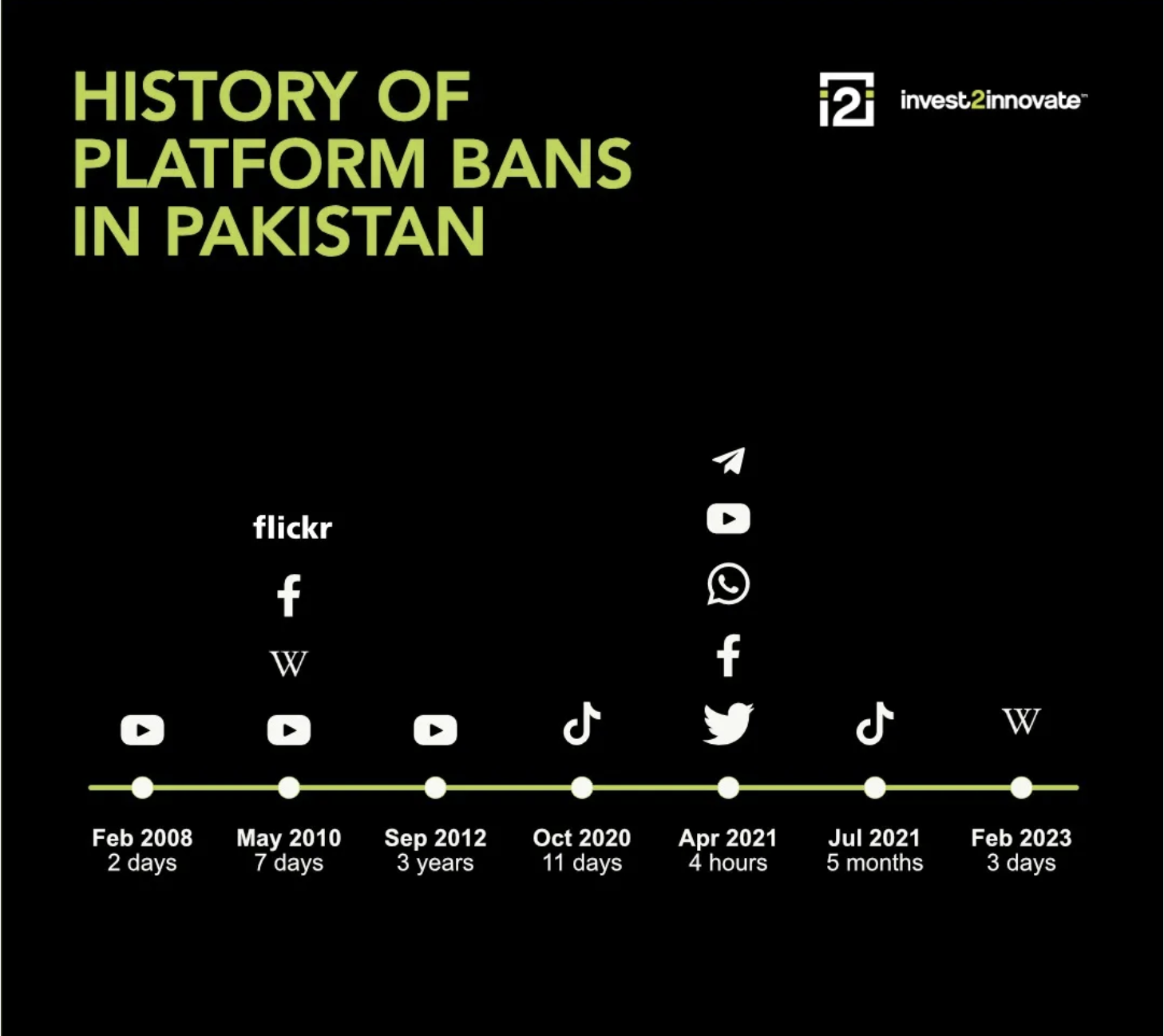Introduction
Online platforms are the epicenter of communication and information dissemination in the modern technological world. In Pakistan, internet penetration stands at 36.5%, with 82.9 million internet users as of January 2022. Despite this significant user base, there remains a critical need for dialogue and advocacy for freedom of expression. Recently, on February 4th, Wikipedia trended on Pakistani Twitter for being banned by the Pakistan Telecommunication Authority (PTA) for hosting ‘sacrilegious content’. This is not an isolated incident, as Pakistan has a history of similar platform bans.
History of Platform Bans in Pakistan
Where We Stand
Pakistan is ranked as ‘Not Free’ on the “Freedom on the Net Index”, scoring 26/100. This is lower compared to similar ecosystems ranked as ‘Partly Free’, such as Bangladesh (43/100), Indonesia (49/100), Nigeria (57/100), and the Philippines (65/100). Additionally, Comparitech’s Internet censorship metric scores Pakistan an 8/11, considering blocks on torrents, political media, social media, and VPNs.
Ramifications for the Startup Ecosystem
Investor Confidence
Blanket platform bans significantly impact the Pakistani startup ecosystem. The ecosystem, currently experiencing a funding dry-up, saw a notable slow down towards the end of 2022, particularly from international investors. Despite a 14-fold increase in international investment since 2019, arbitrary platform bans erode investor confidence. Atif Awan, Founder and Managing Partner at Indus Valley Capital, argues that such bans, resulting in global backlash, deter investors from injecting capital into Pakistan’s digital landscape.
Founder Morale and Opportunities
Platform bans reduce the space for creative freedom and expression among founders. This discourages innovative founders digitizing traditional sectors like agriculture, logistics, and financial services. Moreover, the bans hinder founders’ ability to leverage platforms like TikTok, YouTube, and Instagram for marketing, impacting an estimated 71.7 million social media users in the country.
Economic Impact
Flow of Remittances
Pakistani freelancers attracted approximately $400 million in remittances in fiscal year 2022. Access to educational material is essential for freelancers, especially during the pandemic, with platforms like YouTube serving as top educational tools. Banning such platforms limits people’s ability to skill up and attract remittances.
Deterring Big Companies
The PTA’s stringent compliance requirements, particularly after the introduction of the Removal and Blocking of Unlawful Online Content Rules 2021, deter tech giants like Facebook from setting up in Pakistan. Usama Khilji, Digital Rights Activist and Director at Bolo Bhi, believes that big companies should be incentivized rather than pressured to comply with PTA’s rules.
Comparative Analysis
Is It Just Us?
Pakistan is not alone in practicing internet censorship. Recently, Turkey restricted access to Twitter amid criticism of the state’s response to an earthquake. Countries like Nigeria, China, India, Iran, and North Korea regularly practice internet censorship in the name of regime protection, public order, safety, and moral policing. Unlike China, where ByteDance created local alternatives to WhatsApp and TikTok, Pakistan’s draconian laws discourage local players from creating alternatives, as platforms are banned for being perceived as immoral rather than foreign.
Conclusion
Platform bans have far-reaching consequences for Pakistan’s startup ecosystem. They damage investor confidence, dampen founder morale, and impact the economy. To foster a supportive digital environment, it is crucial to promote freedom of expression and incentivize compliance rather than imposing arbitrary bans.
Stay plugged in!
Awareness and engaging in conversation are the first steps towards driving change. So we’ve compiled a list of inspiring digital activists below, who will surely keep you up to date:
Mubariz Sidiqui from Carbon Law
Usama Khilji from Bolo Bhi
Farieha Aziz from Bolo Bhi
Nighat Dad from Digital Rights Foundation
Shmyla from Digital Rights Foundation
While the most recent ban on Wikipedia was reversed in 3 days, following the Prime Minister’s directive, we are still far from solving the problem. In a country like Pakistan, with a bulk of the population under 30, internet platforms are the future and a clear structure around content standards, rather than outright censorship would not only help players maneuver the landscape but also aid investors in assessing the risk of investment. While the government is justified in the safety of its citizens, there is a fine line between censorship and security.


Pingback: hfm ดีไหม
Pingback: tải go88
Pingback: ซอฟต์แวร์บริหารงานบริการทำความสะอาด
Pingback: เว็บปั้มติดตาม
Pingback: sex ấu dâm